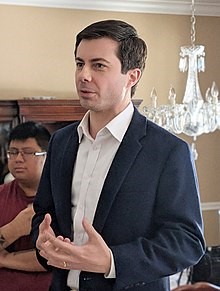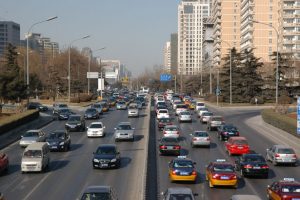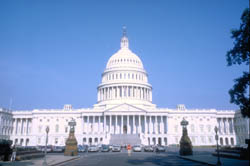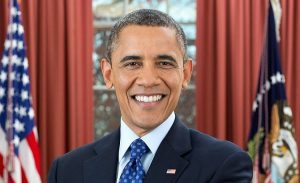Since Pete Buttigieg was confirmed as Secretary of Transportation and started his new job in early February, he has hit the ground running in promoting the Biden-Harris Administration’s agenda, not only in transportation but in combatting the coronavirus pandemic and racism, creating jobs, and mitigating climate change.  While the Department of Transportation is not often the main headline in newscasts unless there is a major accident or plane crash, it is transportation issues that impact almost every American almost every day of our lives.
While the Department of Transportation is not often the main headline in newscasts unless there is a major accident or plane crash, it is transportation issues that impact almost every American almost every day of our lives.
So what is the Department of Transportation, under Buttigieg’s leadership, up to?
Already, Buttigieg (whom we profiled in 2019) has released at least seven press releases in less than a month. He was also able to meet with Amtrak and local transit agency leaders, as well as front line transit and rail workers, before having to quarantine following contact with a security agent who tested positive with the virus. (Buttigieg himself then tested negative.)
The press releases describe the following departmental actions:
- Feb. 17: Applicants are being sought for the Fiscal Year 2021 round of the Infrastructure for Rebuilding America (INFRA) discretionary grant program. These grants “will fund transportation projects of national and regional significance that are in line with the Biden Administration’s priorities including creating good-paying jobs, improving safety, applying transformative technology, and explicitly addressing climate change and racial equity. The funding available for this year’s grants totals approximately $889 million.” The grants will be evaluated on several criteria: the extent to which project sponsors have completed equity-focused community outreach; whether projects are designed to improve connections to underserved communities (such as Opportunity Zones, Empowerment Zones, and the like); and the extent to which the cost-effective projects “apply innovative technology, delivery, or financing methods with proven outcomes.”
- Feb. 25: The Build America Bureau of the Department announced its first Railroad Rehabilitation and Improvement Financing loan: $908 million to the Dallas Area Rapid Transit (DART) for the Silver Line Regional Rail Project.
 The press release went on to explain that this is a refinanced loan from December 2018 that had to be put on hold during the COVID-19 crisis; the new terms will save approximately $190 million in interest costs and will be used, according to Buttigieg, to ensure that new transit stations in the fast-growing Dallas area will be “accessible by walking, biking and wheelchairs [and] provide more options for residents and make it easier for people to choose more affordable and sustainable ways to get around.”
The press release went on to explain that this is a refinanced loan from December 2018 that had to be put on hold during the COVID-19 crisis; the new terms will save approximately $190 million in interest costs and will be used, according to Buttigieg, to ensure that new transit stations in the fast-growing Dallas area will be “accessible by walking, biking and wheelchairs [and] provide more options for residents and make it easier for people to choose more affordable and sustainable ways to get around.” - March 2: The Biden-Harris Department of Transportation has also approved its first Transportation Infrastructure Finance and Innovation Act (TIFIA) loan. This loan of $448.38 million to the Central Texas Regional Mobility Authority for tollway projects in the Austin, Texas, metropolitan area is projected to save more than $80 million in interest costs. The savings due to the refinancing terms will help provide “several pedestrian and bike-friendly features such as paved bicycle and pedestrian shared-use paths, as well as access to trails.”
In a wide-ranging interview with Rolling Stone in early March, Secretary Buttigieg laid out several other DOT initiatives, some of which do not explicitly require legislation:
- The DOT can promote work that communities are already doing, such as walkable and “bikeable” “complete streets.” In other words, not every trip needs to be in a single-occupant vehicle.
- The DOT can team up with the Department of Housing and Urban Development on transit-oriented development to encourage access to public transportation.
- The Department plans “to work with any state or local or tribal or territorial authority that’s seeking to do the right thing” with regard to infrastructure, climate change, etc.

- DOT will strive to be “an engine within the administration of supporting market-making – for example, the overall electrification of the federal fleet. Most of those vehicles are not owned by DOT, but we could be facilitating some of that work.”
- Buttigieg mentioned electric vehicles (EV) several times in his interview. He noted that the “biggest obstacle stops being price and starts being range anxiety. That’s something where I think there’s absolutely a federal role. This is the importance of the president’s goal of half a million EV charging stations around the country.”
 Buttigieg and the Biden-Harris Administration are showing, in just this one agency’s example over one month’s time, a number of important things:
Buttigieg and the Biden-Harris Administration are showing, in just this one agency’s example over one month’s time, a number of important things:
- The federal government, when operating competently and with vision, can be a powerful instrument on behalf of the American people.
- There does not need to be any compartmentalization of priorities: creating jobs, reducing costs, protecting the environment and battling racism can all be pursued at the same time, often with the same projects and initiatives.
- Having Democrats in charge of government agencies does not automatically signal any kind of dangerous “socialism,” “overreach,” or excessive spending of tax dollars.
 Rather, voters should examine agency initiatives and projects from the perspectives of the common good, cost-consciousness, vision, equity and fairness to determine that agency’s and that Administration’s motivations and results.
Rather, voters should examine agency initiatives and projects from the perspectives of the common good, cost-consciousness, vision, equity and fairness to determine that agency’s and that Administration’s motivations and results.
The Department of Transportation under the leadership of Pete Buttigieg is a breath of fresh air following four years being led by the wife of the self-described “Grim Reaper” (Senator Mitch McConnell), Elaine Chao. A quick look at Chao’s time at DOT’s helm is sobering:
- She “engineered broadly anti-environmental policies that neglected critical transportation improvements for anyone but drivers, while also inequitably distributing taxpayer funds to benefit her home state and allowing our nation’s automobile fleet to get dirtier.”
- She routinely obstructed sustainable projects and kept grant applicants in suspense as to whether they would receive grants for which they had applied.
 She “completely revamped Obama’s signature TIGER [Transportation Investment Generating Economic Recovery] program, which provided key funds for biking, walking, and especially transit, and transformed it into the BUILD program, which rapidly morphed into a cash cow for rural highway projects.”
She “completely revamped Obama’s signature TIGER [Transportation Investment Generating Economic Recovery] program, which provided key funds for biking, walking, and especially transit, and transformed it into the BUILD program, which rapidly morphed into a cash cow for rural highway projects.”- Chao and her DOT reversed basic fuel economy standards across the automobile industry, which increased carbon emissions nationwide. She further repealed simple and relatively easy-to-implement resolutions that merely asked state departments of transportation to measure transportation-related greenhouse gas emissions.
- Chao’s DOT greatly reduced measures that would improve pedestrian safety. Agencies such as the National Highway Traffic Safety Administration and the Federal Motor Vehicle Safety Administration “failed to enact new vehicle safety technology that’s now common across the globe, including automatic emergency braking systems, blind spot detection, passive alcohol detection systems, and speed limiters, especially on commercial vehicles.”
Now we read about Chao’s additional problems as former DOT Secretary: the Transportation Department’s inspector general has reported that Chao “repeatedly used her position and agency staff to help family members who run a shipping business with ties to China.” These actions point to several potential ethics violations: using public office for private gain (such as publicity or favors); failing to act impartially to ensure that officials do not offer preferential treatment to any private organization or person; and using their public office to endorse a product, service or company or for the private gain of friends, family or others.
These problems were uncovered during the Trump Administration but, not surprisingly, that Justice Department failed to follow up. Chao has, of course, defended her actions. It seems a shame that someone who is so talented and intelligent should have done such questionable things in her life, not only as DOT Secretary but throughout her career.
At any rate, we now have a new day dawning at the Department of Transportation, for which the American people can be grateful. We will be interested to witness its accomplishments as time goes on.
